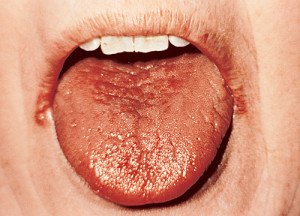Dry mouth or xerostomia is a condition where your body is not producing enough saliva to maintain moisture in your mouth. Saliva is important for proper chewing and swallowing of food and plays a very important role in maintaining pH balance in your mouth to prevent dental decay.
What Are the Cause of Dry Mouth?
Most commonly, dry mouth is caused as a side effect of many common prescription medications that we may be taking or as a symptom of a few diseases including Sjogren’s Sydrome.
Dry mouth is can occur at any age, but more common in older adults due to the types of medications they may be taken.
There are many medications that can cause dry mouth and they include medications for high blood pressure, heart disease, depression and other mood disorders, asthma, pain and seasonal allergies.
What are the Symptoms of Dry Mouth?
- Lack of saliva or saliva that is thick and stringy
- Cracked lips and/or the corners of the mouth
- Trouble chewing, swallowing, tasting, or speaking
- Lips that stick to your teeth or dentures
- Dry or burning sensation of the soft tissues of the mouth including your tongue or throat
What are the Negative Affects of Dry Mouth?
- A sudden increase in tooth decay, especially on exposed root surfaces
- Increase in plaque buildup which can lead to a worsening of gingivitis and gum disease
- Bad breath (halitosis)
- Dentures that do not fit well or are uncomfortable to wear
What Can You Do to Manage Dry Mouth?
- Brushing and flossing and cleaning your dentures at least twice a day
- Brushing with a toothpaste with a higher concentration of fluoride (as directed by your dentist)
- Use of fluoride gel trays or rinse (as directed by your dentist)
- Use of sugar-free (eg: xylitol) gum or mints to stimulate saliva
- Speak with your dentist about other products that may be available to help keep your mouth moist
- Ensure that you visit your dentist and hygienist for regular examinations and hygiene appointments at least every six months
*SOURCE: BC Dental Association, Dry Mouth



